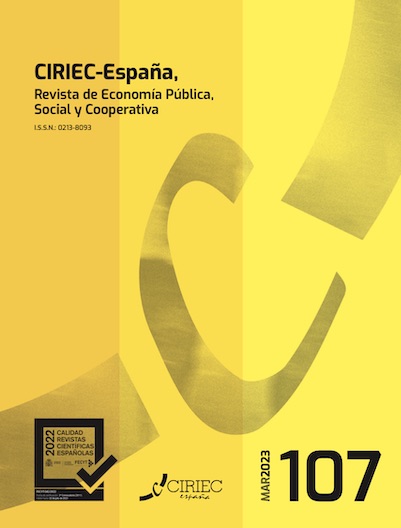Mutualism and welfare: experiences, debates and policies on social security sustainability in Portugal (1860-1934)
DOI:
https://doi.org/10.7203/CIRIEC-E.107.22762 Resumen
Resumen
Mutualism is widely recognised as key to the origin of welfare states in central and northern Europe. However, there is little knowledge about this relationship in the southern region, where welfare systems took on a particular character (Minesso, 2018). This article provides an overview of the long-term relationship between the mutualist movement and the emergence of a welfare system in Portugal. It is hoped that this study will contribute to our understanding of the agency of social movements in the design of social policies, taking into account the Portuguese case study.
Following Topalov’s analytical model (Topalov, 1999), it examines the mutualist movement as a network that fostered social reform. To this end, the resolutions of mutualist congresses were analysed, from the 1865 1st Social Congress to the 1934 Mutualist Congress, the last before the 1974 revolution. Additionally, official surveys and social policies were examined from the first 1860 survey of mutual aid associations to the extinction of the Compulsory Social Insurance Institute in 1933.
The relational analysis of this evidence proves the importance of mutual societies as a laboratory of experimentation, observation, and statistical inquiry into social welfare, promoting consensus-building on state intervention in the sphere of social security, dealing with specific social risks. These findings contribute substantially to our understanding on the relationships between social mobilisation and public policies in a Southern setting during the liberal period.
 Descargas
Descargas
Descargas
Publicado
Cómo citar
-
Resumen275
-
PDF 187
Número
Sección
Licencia
El Copyright será de CIRIEC-España, revista de economía pública, social y cooperativa, a los solos efectos de favorecer la difusión de los artículos publicados (firmar contratos de difusión, de integración en bases de datos, etc.). Los autores también mantienen el copyright sobre su obra y pueden depositar su artículo en el formato electrónico oficial de la revista en su página web personal y en los repositorios institutionales de su grupo de investigación. No obstante, se autoriza la reproducción y distribución de todos los artículos publicados, siempre que no se modifique el contenido y se indique su origen (CIRIEC-España, revista de economía pública, social y cooperativa, número y dirección electrónica del documento o DOI). El envío de un artículo a CIRIEC-España, revista de economía pública, social y cooperativa supone la aceptación de estas condiciones.



